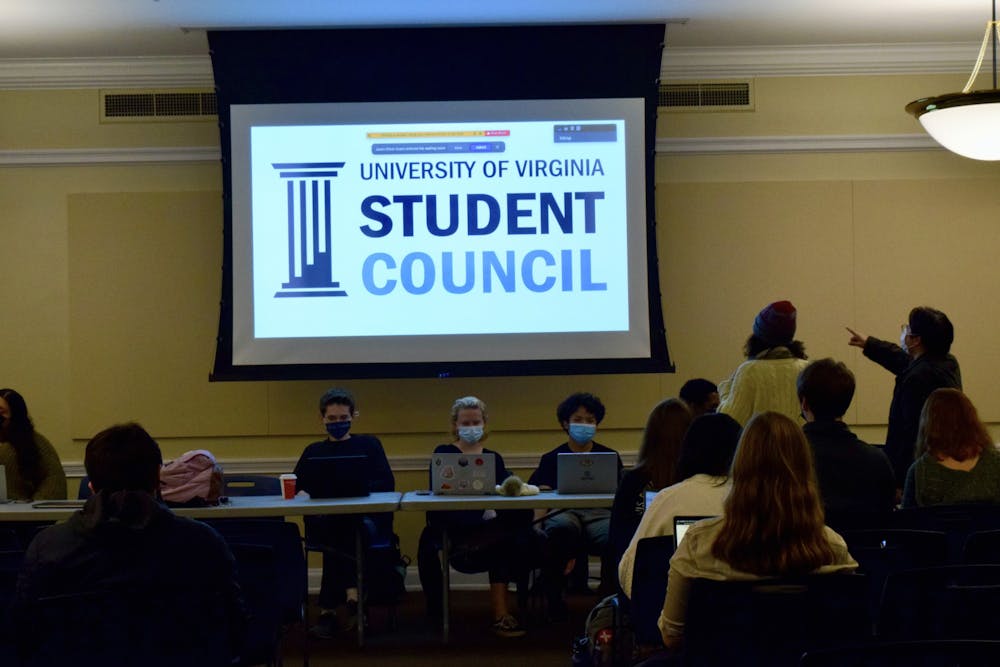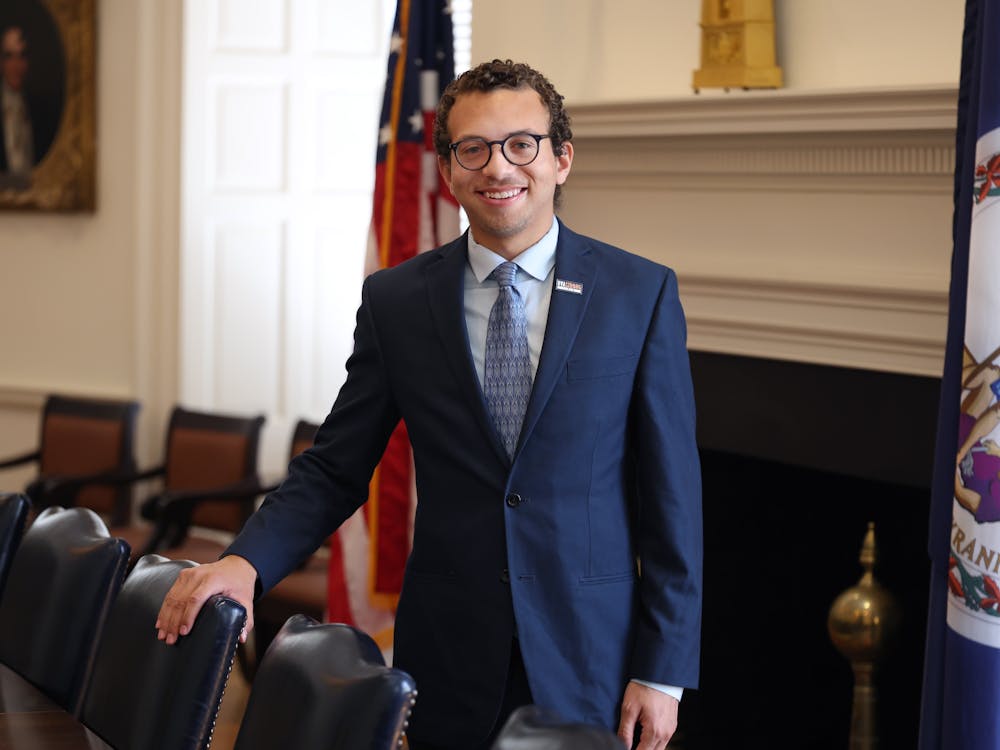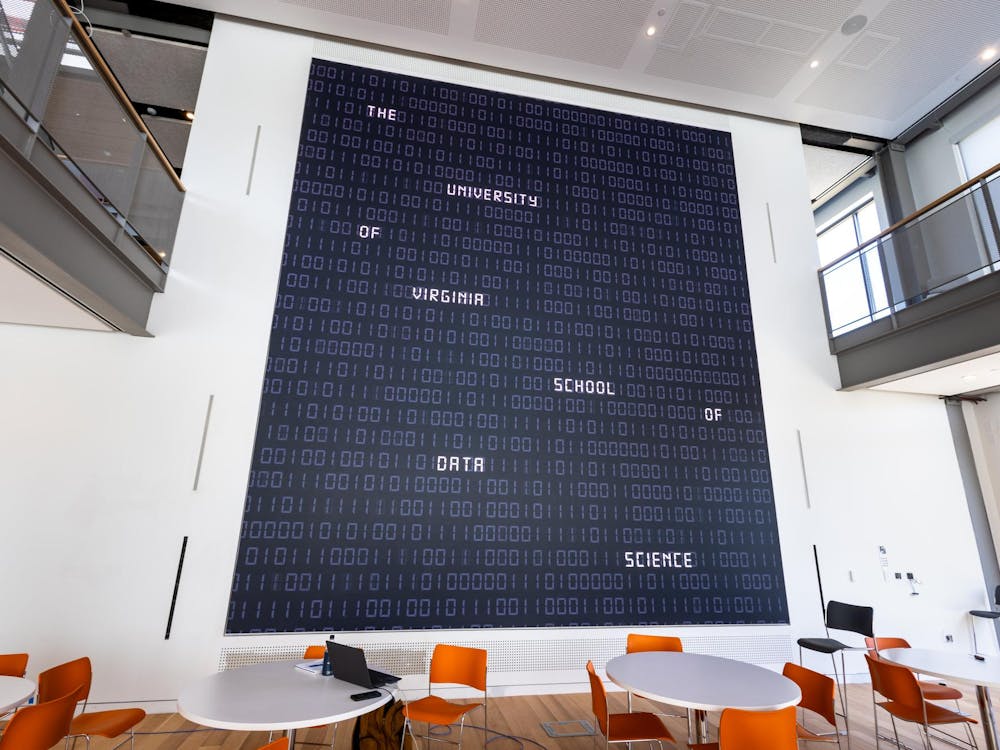Student Council hosted two representatives from the U.Va. Finance Office during its general body meeting Tuesday to discuss proposed tuition and fee changes for the 2022-23 and 2023-24 academic years. Student Council leadership also provided updates on the representative body’s resolution demanding that a portion of this tuition increase be allocated towards student grants for the Aetna Student Health Plan, which students without private health insurance are required to purchase.
Presentation from U.Va. Finance Office
The meeting began with a presentation from Bill Ashby, associate vice president of financial strategy and Katie Walker, executive director of financial planning and analysis. The presentation outlined proposed tuition and fee increases, the University’s strategic and financial context, disaggregated expenses within the University’s operational budget and the University’s endowment, which reached $14.5 billion this year.
Walker said the University plans to propose an undergraduate tuition increase of 3.5 to 4.9 percent for both the 2022-23 and 2023-24 academic years, as well as a housing fee increase of 3.5 percent and a dining rate increase of 4.3 percent. These increases will be open for public comment during a public form Dec. 2 and will be voted on by the Board of Visitors the following week.
For first, second and fourth-year students in the College of Arts and Sciences, the cost of undergraduate tuition and fees for fall 2021 is $14,188 for in-state students and $48,036 for out-of-state students. Current third-year students in the College pay $16,888 if they are in-state and $50,376 if they are out-of-state as part of a tuition increase plan that was approved in 2019.
The Board of Visitors last approved a tuition increase of 2.5 percent for in-state undergraduate students and 3.5 percent for out-of-state undergraduate students for the 2018-19 year. In April 2019, the University rolled back its previously-announced tuition increase for in-state undergraduates for the 2019-20 year in response to additional state funding.
Ashby said the proposed increase accounts for various financial pressures incurred by the University after implementing a tuition freeze for this year. The proposed increase this year is intended to offset this freeze, as well as counteract unforeseen COVID-19 expenditures, unprecedented periods of inflation, faculty retention and financial aid.
Ashby explained that the University commits to meeting 100 percent of student financial need through its AccessUVA program, which provides need-based grants and maintains a loan cap for all students. Ashby highlighted the increasing pressure on the program, which accounts for an increasing portion of growing student financial need relative to federal and state funding and gifts and endowments.
“The trend over time here [is that] the number of students who have need has increased, and the amount of that need has increased,” Ashby said. “That has largely been funded by tuition grants.”
Virginia’s minimum wage rise and increased payment for front-line workers at the University also drives the proposed tuition increase, Ashby and Walker said. The minimum wage in Virginia, which was increased to $9.50 per hour this past May, is set to increase to $11 per hour on Jan. 1, 2022 and $12 per hour on Jan. 1, 2023. The University began paying its frontline workers — full-time benefits-eligible employees in the academic division and medical center — $15 per hour in January 2020.
In addition to the undergraduate tuition increase, graduate and professional schools have proposed increases to their respective tuition rates for the 2022-23 year as well. The School of Continuing and Professional Studies is considering an increase of up to 10.9 percent, while the Engineering and Applied Sciences program and the Global Commerce Scholars program are considering increases of up to 5.6 percent and up to 6.8 percent, respectively.
Student Council members and representatives posed questions about expenses and student concerns after the pair’s presentation. Concerns included the net tuition increases for students based on their current financial aid packages and updates on including Aetna insurance grants in AccessUVA the following year.
Ashby clarified that if the cost of attendance rises with proposed tuition and fee changes, student aid eligibility will increase proportionally.
During a special legislative session Nov. 3, the representative body of Student Council passed a resolution requesting that the increased tuition support a $30 to $45 million dollar pool for Aetna Student Health Plan grants. Students who do not have health insurance are required to purchase Aetna Health insurance plans, which cost $3,148 and are not covered by financial aid. Under the proposal, a portion of the revenue from increased tuition would expand AccessUVA to provide the funding for grants.
Ashby said the proposal has been well-received by the University and University officials are considering what source of funding would be used to support the proposed grants.
Abel Liu, president of Student Council and fourth-year College student, added that he met with University President Jim Ryan and Provost Liz Magill and expects a formal proposal or recommendation in the upcoming days.
Public comment for the tuition proposals will take place Dec. 2 in Ern Commons.
Executive Board updates
Student Council’s Executive Board then provided various updates. Abel Liu, president of Student Council and fourth-year student, first said he has received confirmation that Housing and Residence Life, the Equity Center, and the University Police Department are prepared to approve the University Networks of Care pilot program, which is set to launch in fall 2022. UNOC is a community-based crisis response program through which paid emergency medical technicians and trained post-graduate counselors would respond to nonviolent mental health crises in lieu of police officers from UPD.
Adrian Mamaril, chief of Support and Access Services and third-year Commerce student, also announced an additional round of funding for its Mutual Aid program, which is a community-based initiative that raises funding within the University community to provide grants to students in need. The round will open this week. Mamaril also noted that many tickets remain for student Airbus transportation to Richmond for winter break.
Kristin Capitan, director of student life and third-year Commerce student, also provided an update on an initiative regarding the University’s transition to Office 365, which is being led by second-year College student Ava Proehl. Capitan said project leaders have been meeting with IT administrators to address student concerns and noted that administrators are interested in working with contracted independent organizations that use Google Drive to house large historical archives.
The updates ended with a presentation from Lydia Qian, director of the Accommodations Access Fund and second-year College student, on the progression of the Accommodations Access Fund. AAF is an initiative within Student Council’s Support and Access Services Branch that provides support for students with financial aid who are seeking services from the Student Disability Access Center. Liu outlined future steps for the program, including the development of an application for funds and beginning open office hours for students to talk to professionals with different aid and SDAC resources.
Student Council meetings take place every Tuesday in the Newcomb Hall South Meeting Room and students can attend in-person or virtually.







